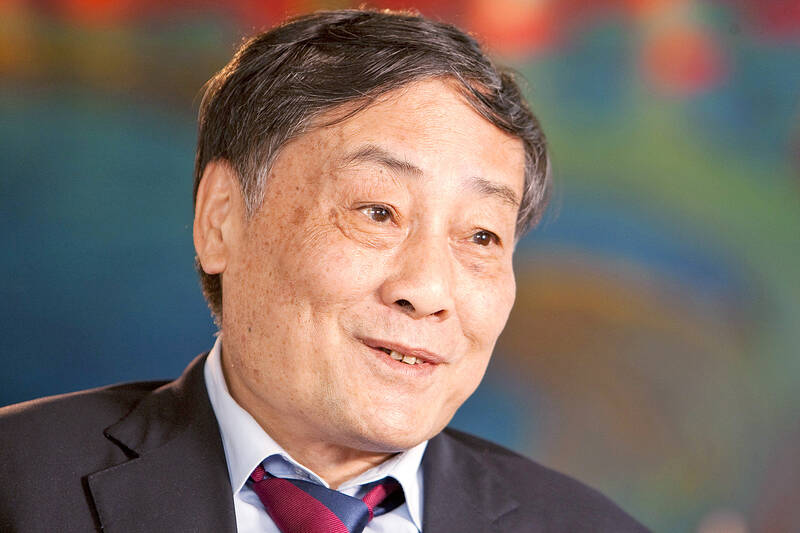Chinese business magnate Zong Qinghou (宗慶后), whose leading beverage firm once made him the richest person in the country, died yesterday, his company said.
He was 79.
Zong was the founder of the Wahaha Group Co (娃哈哈集團), which specializes in bottled water, soft drinks, tea and other products.

Photo: Bloomberg
He died yesterday morning after “treatment for an illness proved ineffective,” the company said in an obituary on a Chinese microblogging site.
A memorial service for Zong is to be held on Wednesday at the company’s offices in the eastern city of Hangzhou, the statement said.
Chinese state media reported last week that Zong was receiving hospital treatment, but gave no details of his illness.
Zong went into business in his 40s, selling soft drinks to children and reportedly being so short of cash that he slept under a bridge in Beijing because he could not afford a hotel.
He established Wahaha in 1987 and built it into a beverage giant whose drinks are a fixture in shops and kiosks across China.
In 2010, Zong was listed by Forbes magazine as China’s richest person with a US$8 billion fortune.
Its estimate last year put him in 53rd place nationally with a net worth of US$5.9 billion.
The tycoon previously voiced support for lowering taxes as a strategy for boosting investment, telling reporters in 2013 that China’s growing wealth inequality was not a problem.
“If we had egalitarianism... we wouldn’t have enough to eat,” Zong said at the time. “It’s best to encourage people to create wealth.”
In recent years, Wahaha — whose name means “Laughing Child” in Chinese — has branched out into various other sectors including baby milk and clothing.
In 2021, Zong took a step back from frontline work, appointing his daughter Zong Fuli (宗馥莉), also known as Kelly Zong, as Wahaha’s vice chairperson and president.

TAKING STOCK: A Taiwanese cookware firm in Vietnam urged customers to assess inventory or place orders early so shipments can reach the US while tariffs are paused Taiwanese businesses in Vietnam are exploring alternatives after the White House imposed a 46 percent import duty on Vietnamese goods, following US President Donald Trump’s announcement of “reciprocal” tariffs on the US’ trading partners. Lo Shih-liang (羅世良), chairman of Brico Industry Co (裕茂工業), a Taiwanese company that manufactures cast iron cookware and stove components in Vietnam, said that more than 40 percent of his business was tied to the US market, describing the constant US policy shifts as an emotional roller coaster. “I work during the day and stay up all night watching the news. I’ve been following US news until 3am

Six years ago, LVMH’s billionaire CEO Bernard Arnault and US President Donald Trump cut the blue ribbon on a factory in rural Texas that would make designer handbags for Louis Vuitton, one of the world’s best-known luxury brands. However, since the high-profile opening, the factory has faced a host of problems limiting production, 11 former Louis Vuitton employees said. The site has consistently ranked among the worst-performing for Louis Vuitton globally, “significantly” underperforming other facilities, said three former Louis Vuitton workers and a senior industry source, who cited internal rankings shared with staff. The plant’s problems — which have not

TARIFF CONCERNS: The chipmaker cited global uncertainty from US tariffs and a weakening economic outlook, but said its Singapore expansion remains on track Vanguard International Semiconductor Corp (世界先進), a foundry service provider specializing in producing power management and display driver chips, yesterday withdrew its full-year revenue projection of moderate growth for this year, as escalating US tariff tensions raised uncertainty and concern about a potential economic recession. The Hsinchu-based chipmaker in February said revenues this year would grow mildly from last year based on improving supply chain inventory levels and market demand. At the time, it also anticipated gradual quarter revenue growth. However, the US’ sweeping tariff policy has upended the industry’s supply chains and weakened economic prospects for the world economy, it said. “Now

COLLABORATION: Given Taiwan’s key position in global supply chains, the US firm is discussing strategies with local partners and clients to deal with global uncertainties Advanced Micro Devices Inc (AMD) yesterday said it is meeting with local ecosystem partners, including Taiwan Semiconductor Manufacturing Co (TSMC, 台積電), to discuss strategies, including long-term manufacturing, to navigate uncertainties such as US tariffs, as Taiwan occupies an important position in global supply chains. AMD chief executive officer Lisa Su (蘇姿丰) told reporters that Taiwan is an important part of the chip designer’s ecosystem and she is discussing with partners and customers in Taiwan to forge strong collaborations on different areas during this critical period. AMD has just become the first artificial-intelligence (AI) server chip customer of TSMC to utilize its advanced